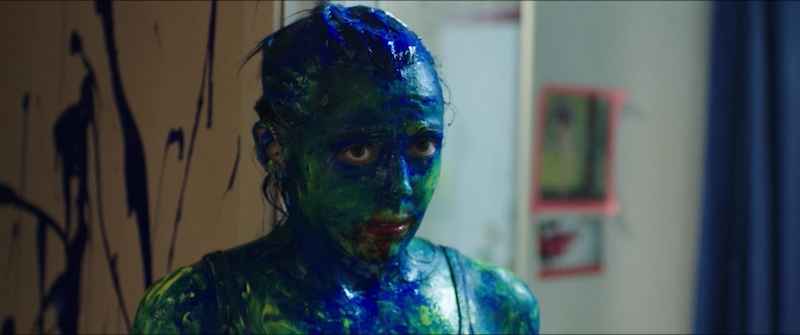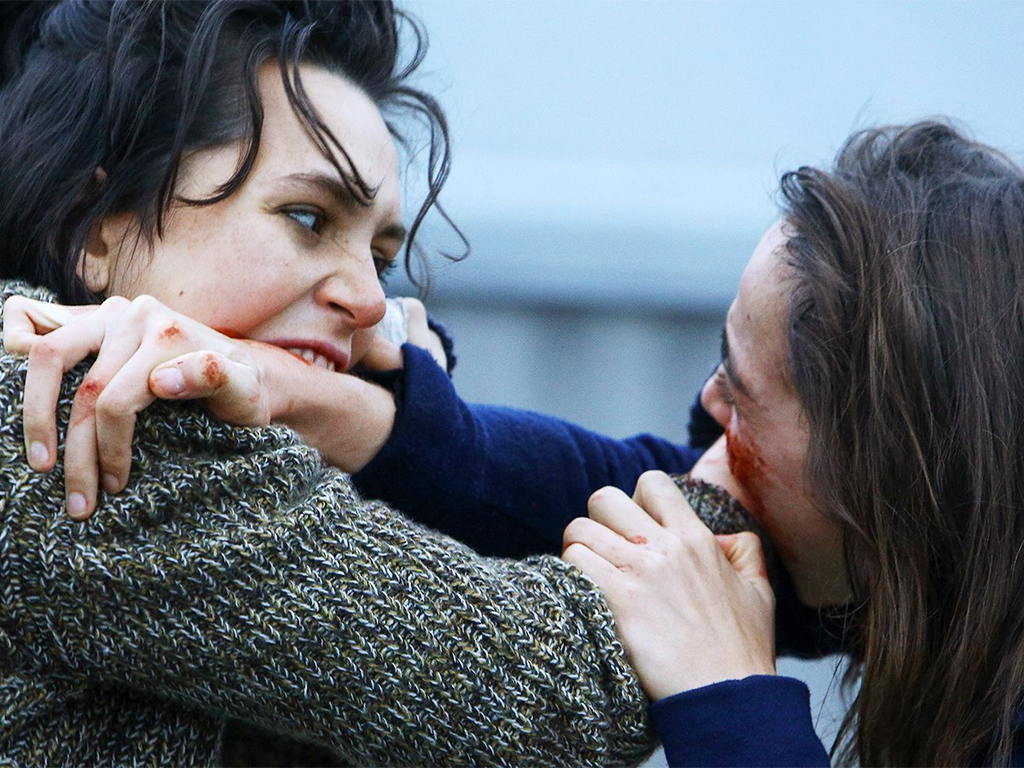Vibe:
Unsettling and difficult to categorize. "Raw" exists outside of reality in a "Twin Peaks" Season One kind of way. To enjoy it, you must completely suspend your disbelief and succumb to Julia Ducournau's fucked up, gloomy, alcohol-fueled world.
You might find yourself running into some logical roadblocks during the viewing, but I urge you to shrug them off until after you've finished watching. If you're a fan of films like "Heavenly Creatures" (Jackson, 1994) and Ginger Snaps" (Fawcett, 2001), I think you'll enjoy "Raw." Just clear your mind, eat a weed gummy, and let Ducournau take you on a bloody journey through one young woman's adolescent hellscape. It's fun! Trust me.
Best time to watch:
Next time you feel like hosting a feminist vampire/cannibal movie marathon. You could screen "Raw," "Trouble Every Day" (Denis, 2001), "A Girl Walks Home Alone at Night" (Amirpour, 2014), "Near Dark" (Bigelow, 1987), and "Only Lovers Left Alive" (Jarmusch, 2014). Serve your guests blood red cocktails and testicles that you've severed from the last man who's wronged you. Please don't forget to invite me; you have my email address.
Worst time to watch:
Whenever you're feeling squeamish and don't want to watch a girl scratch her skin until she bleeds, cut off her sister's finger with scissors, eat various bits of human flesh, etc.
Critics talk about this film like it's a heavy-handed gorefest, but it's actually the opposite. The aforementioned parts are totally earned and relatively subtle. They're only disturbing because Ducournau took her time building up to them and let them unravel at the most opportune moments with a deft, skillful approach. This movie is not "Saw" (Wan, 2004) or "Texas Chainsaw Massacre" (Hooper, 1999), so if you usually shy away from horror movies that are graphically violent, know that "Raw" doesn't fall into that category.
Where to watch:
Amazon, iTunes, YouTube, etc. Did you know that you can rent movies on YouTube now? I'm not sure how I missed that new feature.
Quick summary:
Justine (Garance Marillier) is a young woman in her first year of veterinarian school at the weirdest college I've ever seen on film. Both of her parents went there, and her older sister Alexia (Ella Rumpf) is currently a student, but for whatever reason, they've neglected to warn her about the crazy, first-year initiation process. Justine, like her parents, is a vegetarian, and after she's goaded into eating a piece of rabbit kidney during a freshman hazing ritual, crazy shit starts to happen.
Thoughts:
After watching "Raw," I wasn't immediately sold and felt that it suffered from some of the same problems as "Trouble Every Day." For Ducournau, narrative conventions are obviously secondary to mood-building, and I found myself wishing for her to cast them off altogether. I wanted less dialogue, more meaningful stares and beautifully ambiguous imagery. Upon re-watch, I no longer feel that way.
The juxtaposition of realism v. stylization is actually what largely sets the delightfully strange tone of this movie and helps create tension and suspense. It also makes sense, considering we never see or experience anything outside of our protagonist's point-of-view. Justine starts off as a clumsy, naïve, and confused character. She's ostensibly in veterinarian school for the same reasons why she's a vegetarian: because she cares deeply for animals and believes they're just as important as people. Or is she there (and a vegetarian) because it's family tradition and expected of her?
Justine is still figuring out who she is, independent of her parents, and this confusion colors her perception (and by extension, the viewer's) of the world. We hardly ever hear her talk about her struggles, but what we see seems to be an externalized representation of her internal thoughts. Justine is drawn to disturbing situations, but feels repulsed by her behavior and doesn't want anyone to find out what she actually likes/desires since it feels so outside the realm of normal.
When her nasty rash gets out of control, Justine goes to see a nurse (Marion Vernoux), an older woman who not only treats the condition but offers up an interesting parable. The nurse tells a story about a student who once came to see her for blood tests. After the tests were successfully completed, the student started to cry because, "[The nurse was] the first person to not mention her weight." Apparently, interns sent her ward-to-ward and she was repeatedly told she was so fat that they couldn't find a vein.
Justine asks why the student didn't report the situation and the nurse replies, "Why? Don't know. To not bother anyone, I guess. She kind of stood out. She probably wanted to be average. How do you see yourself?" And of course, Justine replies, "average."
This scene happens early, around 25 minutes in, and as the movie progresses, we watch Justine realize and come to terms with the fact that she is far from average. She doesn't just want to drink and have sex; she also wants to eat people. While the other students aren't exactly tame (there's a party scene where one woman licks a guy's eyeball), their carnal desires are much more conventional than Justine's.
During the blue and yellow paint party, Justine bites off part of her makeout partner's mouth. The shot of her reaction after everyone sees him and realizes what must have happened is telling:

It's a mixture of fear, stilted desire, and disgust. I imagine that she's thinking some combination of the following:
- Is this who I actually am?
- What's wrong with me?
- Does this make me a horrible person?
It's clear that Justine doesn't actually want to hurt anyone. At the end of the film, she's heartbroken to find that her sister has murdered Adrien (Rabah Naït Oufella) and eaten part of his leg. As we find out in the final scene with her father (Laurent Lucas), Alexia was always encouraged to be fully herself, often, presumably, to the detriment of others. Her father feels horrible that he didn't think of some kind of solution to help her with her problem.
Figuring out a solution for how to exist in the world as your most authentic self without hurting other people is part of becoming an adult. We all have issues that make us "abnormal" and put us in danger of harming other people. I might not have the desire to physically bite someone's head off, but I often have to force myself to stop from doing it metaphorically.
Instead of reading this film's cannibalism solely as a metaphor for budding sexuality, I see it as a physical representation of the challenges of adulthood and learning how to become a functional human being. Identifying character flaws and learning how to cope with them is, in my opinion, the hardest part of being an adult. As a teenager, there are a plethora of excuses at your disposal that allow you to (sort of) get away with being a total asshole; as an adult, there really aren't any. And what's more horrifying than that?





